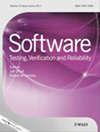Model checking, testing and debugging
IF 1.2
4区 计算机科学
Q3 COMPUTER SCIENCE, SOFTWARE ENGINEERING
引用次数: 0
Abstract
This issue contains four papers. The first paper focuses on model checking, the second and third papers focus on testing and the last paper focuses on debugging. The first paper, ‘Model checking C++ programs’ by Felipe R. Monteiro, Mikhail R. Gadelha and Lucas C. Cordeiro, is motivated by memory safety issues and how these have proved to be a source of security vulnerabilities. The authors devised a novel bounded model checking approach. The first step was to encode a number of C++ features in a decidable fragment of first-order logic. SMT solvers were then used to carry out verification. In experiments, the proposed approach was found to outperform state-of-the-art verifiers. The prototype tool also found arithmeticoverflow errors in a commercial application. (Recommended by Professor Pretscher) The second paper, ‘GPU acceleration of finite state machine input execution: Improving scale and performance’, by Vanya Yaneva, Ajitha Rajan and Christophe Dubach looks at the problem of executing a large number of tests on a finite state machine (FSM). The motivation for this work is model validation. The approach devised uses GPUs to allow multiple tests to be run in parallel. The authors built on their previous work, which showed how FSM execution can be performed on a GPU, by addressing a number of limitations. In particular, the authors addressed the data transfer overhead and they also performed experiments with FSMs that were too large to fit into GPU memory. In the experiments, the novel optimisations led to further improvements, with the GPU being over four times faster, on average, than a 16-core CPU. (Recommended by Professor Pretscher) The third paper, ‘Survey on test case generation, selection and prioritization for cyber-physical systems’, by Zahra Sadri-Moshkenani, Justin Bradley and Gregg Rothermel, presents a survey of approaches that generate, select or prioritise test cases for cyber-physical systems. The authors identified 34 related papers (26 papers on test generation, 6 papers on test selection and 7 papers on test prioritisation) and classified them according to 8 properties distilled by the authors from past experience. From the survey results, the authors identified a number of open challenges. To address some of these challenges, existing approaches may be adapted or new approaches may be developed. (Recommended by Professor Phil McMinn) The fourth paper, ‘Effective fault localization and context-aware debugging for concurrent programs’, by Justin Chu, Tingting Yu, Jane Huffman Hayes, Xue Han and Yu Zhao, presents Coadec, an approach for automatically generating interthread control flow paths to diagnose concurrency bugs. Coadec consists of two phases: concurrency fault localization and context-aware debugging. The authors evaluated Coadec on 10 real-world multithreaded Java applications and showed that Coadec outperforms state-of-the-art approaches for localising concurrency faults and that Coadec’s context debugging can help developers understand concurrency fault by inspecting a small percentage of code. (Recommended by Marc Roper)模型检查、测试和调试
这期有四篇论文。第一篇论文的重点是模型检查,第二篇和第三篇论文的重点是测试,最后一篇论文的重点是调试。第一篇论文是由Felipe R. Monteiro、Mikhail R. Gadelha和Lucas C. Cordeiro撰写的《c++程序的模型检查》,其动机是内存安全问题,以及这些问题如何被证明是安全漏洞的来源。作者设计了一种新的有界模型检验方法。第一步是在一阶逻辑的可确定片段中编码一些c++特性。然后使用SMT求解器进行验证。在实验中,所提出的方法被发现优于最先进的验证器。原型工具还在商业应用中发现了算术覆盖流错误。第二篇论文,“有限状态机输入执行的GPU加速:改进规模和性能”,由Vanya Yaneva, Ajitha Rajan和Christophe Dubach撰写,着眼于在有限状态机(FSM)上执行大量测试的问题。这项工作的动机是模型验证。设计的方法使用gpu来允许多个测试并行运行。作者在他们之前的工作的基础上,通过解决一些限制,展示了如何在GPU上执行FSM。特别地,作者解决了数据传输开销,他们还对太大而无法装入GPU内存的fsm进行了实验。在实验中,新的优化带来了进一步的改进,GPU的平均速度是16核CPU的四倍多。第三篇论文,“对网络物理系统的测试用例生成、选择和优先级的调查”,由Zahra Sadri-Moshkenani、Justin Bradley和Gregg Rothermel撰写,介绍了为网络物理系统生成、选择或优先级测试用例的方法的调查。作者选取了34篇相关论文(26篇关于测试生成,6篇关于测试选择,7篇关于测试优先级),并根据作者从过去经验中提炼出来的8个属性对其进行了分类。从调查结果中,作者确定了一些开放的挑战。为了应对其中的一些挑战,可能会调整现有的方法或开发新的方法。第四篇论文,“并发程序的有效故障定位和上下文感知调试”,由Justin Chu、Tingting Yu、Jane Huffman Hayes、Xue Han和Yu Zhao撰写,介绍了Coadec,一种自动生成线程间控制流路径来诊断并发错误的方法。Coadec包括两个阶段:并发错误定位和上下文感知调试。作者在10个真实的多线程Java应用程序上评估了Coadec,并表明Coadec在定位并发性错误方面优于最先进的方法,而且Coadec的上下文调试可以帮助开发人员通过检查一小部分代码来理解并发性错误。(Marc Roper推荐)
本文章由计算机程序翻译,如有差异,请以英文原文为准。
求助全文
约1分钟内获得全文
求助全文
来源期刊

Software Testing Verification & Reliability
工程技术-计算机:软件工程
CiteScore
3.70
自引率
0.00%
发文量
34
审稿时长
>12 weeks
期刊介绍:
The journal is the premier outlet for research results on the subjects of testing, verification and reliability. Readers will find useful research on issues pertaining to building better software and evaluating it.
The journal is unique in its emphasis on theoretical foundations and applications to real-world software development. The balance of theory, empirical work, and practical applications provide readers with better techniques for testing, verifying and improving the reliability of software.
The journal targets researchers, practitioners, educators and students that have a vested interest in results generated by high-quality testing, verification and reliability modeling and evaluation of software. Topics of special interest include, but are not limited to:
-New criteria for software testing and verification
-Application of existing software testing and verification techniques to new types of software, including web applications, web services, embedded software, aspect-oriented software, and software architectures
-Model based testing
-Formal verification techniques such as model-checking
-Comparison of testing and verification techniques
-Measurement of and metrics for testing, verification and reliability
-Industrial experience with cutting edge techniques
-Descriptions and evaluations of commercial and open-source software testing tools
-Reliability modeling, measurement and application
-Testing and verification of software security
-Automated test data generation
-Process issues and methods
-Non-functional testing
 求助内容:
求助内容: 应助结果提醒方式:
应助结果提醒方式:


